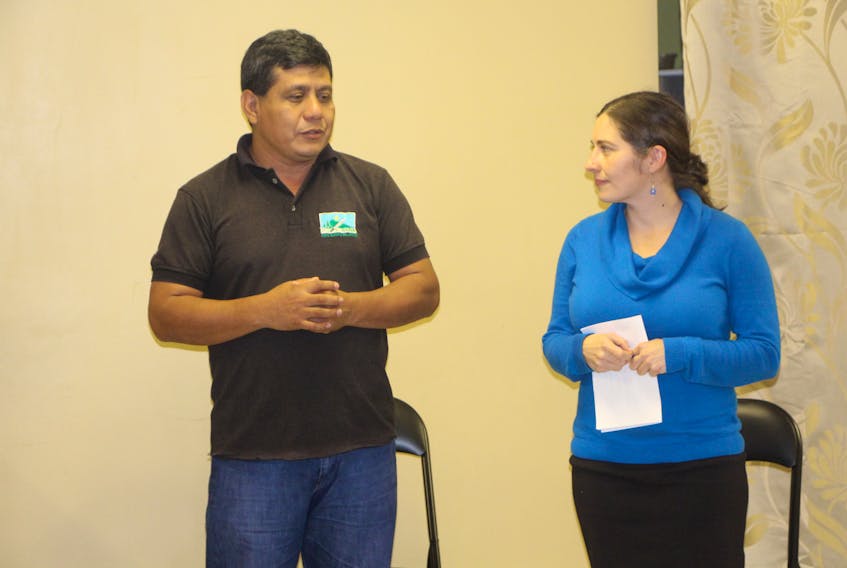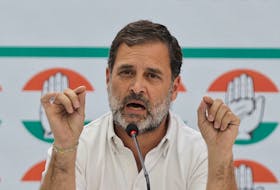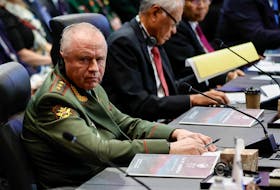A conversation about justice in Guatemala took place a great distance away from the Central American country, Nov. 5. At St. Paul’s Anglican Church in Antigonish, a group of guests listened to Marcello Sabuc, a spokesperson for a human rights group in Guatemala, that struggles to set aright injustices faced by the country’s Indigenous population.
Guests got a firsthand account of the struggles small farm owners and Indigenous groups face in preservation and restoration of their traditional territories, from a member of one group trying to help them.
Marcelo Sabuc, whose words were translated from Spanish into English by local resident Wyanne Sandler, described the state of affairs in Guatemala; a country that is rife with government corruption, cronyism and nepotism between members of the rich elite.
The Comité Campesino del Altiplano (CCDA, or Highlands Committee of Small-Farmers in English), is one of many organizations in Guatemala that fights for human rights for Indigenous farmers that has been active since 1982, dealing with the corruption of the country’s government.
“When our brothers and sisters try to rise up in the struggle for their rights, they are persecuted,” said Sabuc. “They are threatened and killed, in order to silence them, so they can’t keep trying to exercise their rights.”
The CCDA pursues land reform and other labour rights and human right issues, but this is a challenge, given the repression of the government and large business interests in Guatemala, which often come into conflict with the CCDA’s objectives.
Much of the difficulty relates to land access, and defense of land for the export and promotion of sustainable agriculture.
The CCDA, Sabuc noted, faces trouble from the Guatemalan government, and large landowners and corporations that operate within the country with threats, legal actions taken against them, violence committed against them – which includes the assassination of six of its members in the last year.
Sabuc conducted a brief candle-lighting vigil for six members of the CCDA killed in the past year, and spoke of how many community leaders who have worked with the CCDA have also been killed.
Sabuc provided the history of the CCDA, and its role in the wake of the internal armed conflict in the late 1980s that saw indigenous farmers, and artisans massacred in Guatemala.
A peace accord that followed that conflict, which was “about the respect of the indigenous people, their language, their dress and customs,” Sabuc said, noting it was meant to usher in a period of reconciliation.
However, a common thread that runs through the events that happened after the armed conflict is that the Guatemalan government has done little to honour the parameters of that accord, showing preferential treatment for the large corporations and landowners that are in conflict with the Indigenous people in many regions within Guatemala.
The root of the problems in Guatemala is land “that has been accumulated into the hands of a few,” Sabuc said. He alluded to the fact that the most fertile land is taken by the government and set aside for larger business interests, leaving Indigenous families marginalized on poorer, less productive land. Meanwhile, those larger businesses pursue “mega projects” such as a hydroelectric project, and other large industrial and agricultural projects on the better land that divert and pollute waterways.
In many of the land ownership conflicts, the government has sought to criminalize the Indigenous people with whom it is in conflict over land.
“You have communities of people in some areas who have been there for more than 50 years, and then, out of nowhere, a landlord appears and says, ‘this land belongs to me.’ The landlord then forms armed groups that come to repress these families,” Sabuc said.
Although the CCDA has constitutional court rulings in its favour, the Inter-American Commission on Human Rights working to protect some of the communities it assists, and the UN International Commission Against Impunity investigating the government; a combination boundary disputes, and a government that fights them every step of the way continue slow progress.
Sabuc said the CCDA and similar organizations continue to pressure the government to act on land conflicts it has promised to resolve, but progress is slow because of a lack of action, and the oppression of the people with whom the government should be resolving those conflicts.
To date, Sabuc noted the CCDA has been successful in helping 76 large plantations in communities around the country, but their work is far from over. The CCDA is working with 160 communities, using a land fund to buy back indigenous land from the government.
This process is slow, Sabuc said, because many of the judges in the Guatemalan justice system are co-opted by the large land owners and companies – and are connected to the government. He noted this is all happening in a country that struggles with high rates of poverty, inadequate health care, and that invests minimally in education, while putting lots of money into its military presence.
Q and A
Guests had many questions for Sabuc, asking about matters like the lack of news coverage of what goes on in Guatemala. Sabuc explained that the Guatemalan government has a monopoly on news, so little about the CCDA’s fight for land rights makes it out of the country.
When asked what the UN High Commission for Human Rights is doing about the situation, Sabuc said there are various UN bodies at work with the Indigenous people of Guatemala, investigating whether or not the Guatemalan government is living up to its obligations.
When asked about the legal climate of the land disputes in Guatemala, Sabuc elabourated, noting that land disputes are often taken to criminal court in Guatemala. He said the CCDA’s position is that land disputes should be treated as civil processes, rather than taken to a criminal court.









